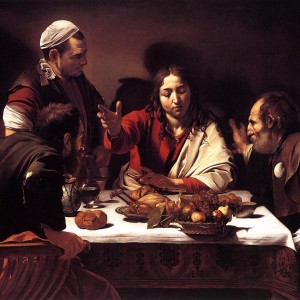One of the most beautiful prayers in the New Testament is the Magnificat (Luke 1:46-55), which tells of the holiness and mercy of God. In that prayer, Mary proclaims (v. 46-49): “My soul magnifies the Lord, and my spirit rejoices in God my Savior, for he has regarded the low estate of his handmaiden. For… Continue reading What the Magnificat Tells Us About Marian Veneration
Tag: apologetics
What Does the Book of James Say About Justification?
Perhaps no single doctrinal issue has caused more division between Catholics and Protestants than the question of justification, or how we are made righteous before God. Catholic believe that we are justified by faith, but must cultivate this faith through good works done in obedience to God (what St. Paul calls the “obedience of faith,” in… Continue reading What Does the Book of James Say About Justification?
Who Was St. Mark? The Story of a Soul.
Today is the Feast of St. Mark, celebrating one of the four Gospel writers. What do we know about him from the Bible? Matthias Stom,The Evangelists Saint Mark and Saint Luke (detail) (1635) The place we hear the most about him is in the Book of Acts. St. Luke generally refers to him in Acts as “John,… Continue reading Who Was St. Mark? The Story of a Soul.
Gay Marriage, Incest, and Polygamy
One of the most often-mocked arguments in the debate over “gay marriage” is the argument that permitting gay marriage leads to permitting incestuous marriages, polygamy, and the like. The problem is, the argument is solid, and I’ve yet to hear a coherent answer for it. For example, Jon Davidson evades the argument, rather than answering it: Jon Davidson Bringing up… Continue reading Gay Marriage, Incest, and Polygamy
Which Books Were in Early Christian Bibles?
What canon of Scripture did the earliest Christians use? A Protestant going by the handle Lojahw (Lover of Jesus and His word) argues that it was the modern Protestant Bible. Specifically, he claimed that: Bartolomeo Cavarozzi, St. Jerome in His Study (1617) There were at least nine church fathers from the second through the fourth centuries… Continue reading Which Books Were in Early Christian Bibles?
Big News …
From left: Archbishop Naumann, Pope Benedict,Fr. Brian Schieber and Fr. Gary Pennings I wanted to take this opportunity to let blog readers know about a big change in my own life that could have an impact on the blog. I’ve been accepted as a seminarian by the Archdiocese of Kansas City, Kansas. My last day… Continue reading Big News …
Flannery O’Connor on the Eucharist and Church History
I know I’ve posted this before, but I’m struck at how beautifully Flannery O’Connor expressed herself regarding both the Eucharist and Church history. First, she famously had this to say of the Eucharist, as recounted in a letter she wrote in December of 1955: Flannery O’Connor “I was once, five or six years ago, taken by some… Continue reading Flannery O’Connor on the Eucharist and Church History
Understanding Christ’s Resurrected Body
Caravaggio, Supper at Emmaus (1601) This Sunday’s Gospel involves one of the Easter Sunday appearances of Jesus Christ to the Disciples. It starts out with the two disciples from the road to Emmaus returning to describe how “Jesus was made known to themin the breaking of bread,” an obvious Eucharistic reference. But in the midst of this… Continue reading Understanding Christ’s Resurrected Body
What Should Christians Think About Adoptive Parenting?
Guido Reni, Saint Joseph with the Infant Jesus (1635) A week ago, a Democratic lobbyist named Hilary Rosen said that Mitt Romney’s wife Ann “has actually never worked a day in her life,” since she’s a stay-at-home mom. A lot of people, particularly stay-at-home parents, were understandably upset. But that doesn’t justify the response of the Catholic League,… Continue reading What Should Christians Think About Adoptive Parenting?
Why Bishops Don’t Say, “The Lord be With You”
When we switched to the new translation of the Mass this past Advent, much was said about the fact that now, when the priest says, “The Lord be with you,” we respond, “and with your spirit,” instead of “and also with you.” In a 2005 newsletter announcing this change, the USCCB explained: Eugeniusz Kazimirowski,Divine Mercy (1934) Where… Continue reading Why Bishops Don’t Say, “The Lord be With You”









